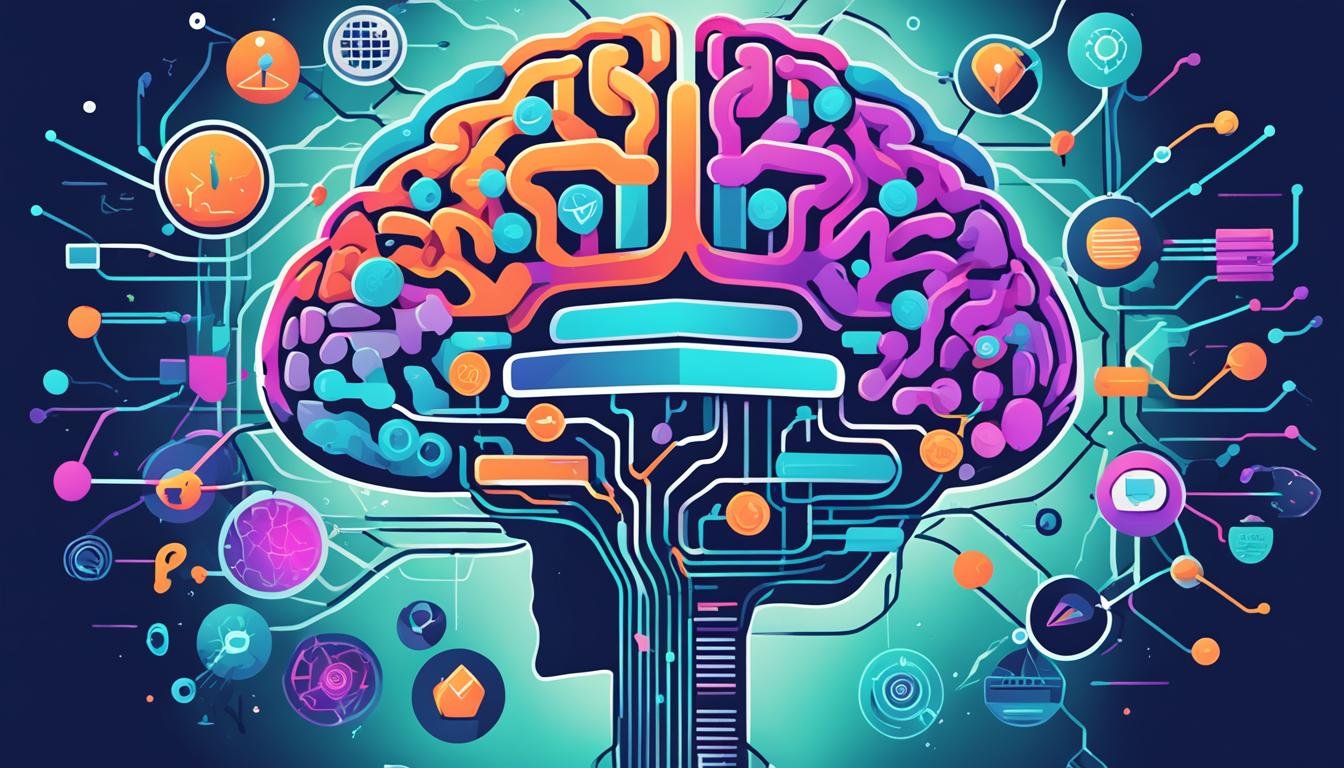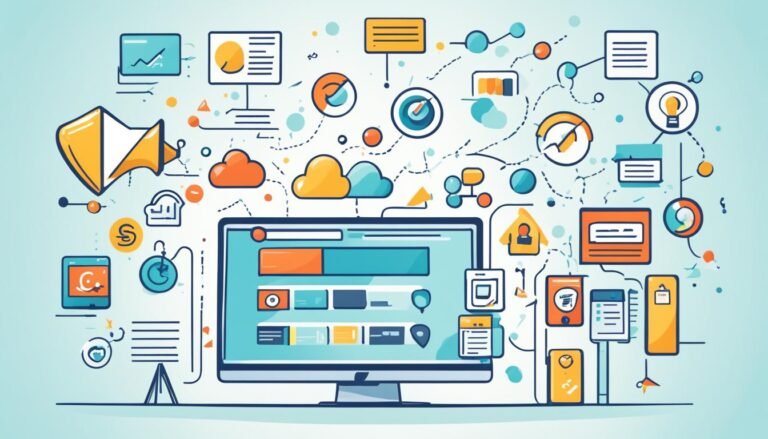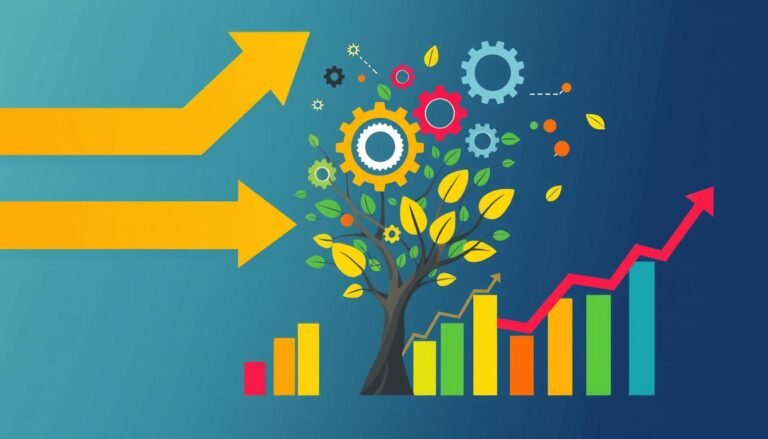How AI is Revolutionizing Database Marketing
Data science and artificial intelligence (AI) are changing marketing. They help companies understand their customers better. This understanding leads to the ability to attract and keep customers.
AI uses smart algorithms to create marketing strategies that fit each customer’s likes. This custom approach leads to more people clicking and buying, boosting sales. Predictive analytics helps businesses plan for the future, making them ready for any changes the market might bring.
Thanks to AI, marketing is becoming smarter and more focused on customers. It’s all about using data and AI to improve how companies connect with buyers.
So, how does AI change database marketing? And what does it mean for businesses that want to do well in marketing? We’ll look at data science, AI personalization, predictive analytics, and real-time marketing. These are key in using AI for marketing success.
Key Takeaways:
- Data science and AI change marketing by finding insights in data and personalizing strategies for customers.
- The use of data in marketing leads to getting and keeping customers more efficiently.
- AI makes personalized campaigns that match what customers want, boosting marketing success.
- Predictive analytics helps companies see upcoming trends and adjust their plans.
- AI’s fast reactions allow businesses to keep up with shifting consumer needs and market trends.
AI gives companies new ways to use data for better marketing. We’ll look deeper into data science, personalized AI, predictive analytics, and quick marketing strategies. We’ll also see real examples of how AI changes digital marketing. Discussing both the benefits and challenges of AI in marketing will help us understand its role better. Let’s see how AI is guiding database marketing towards a more customer-focused, efficient path.
The Power of Data Science in Marketing Success
Data science is changing how marketing works. It uses data to find insights that help companies do better. This helps them see what people like and where the market is going.
Using data makes companies more successful at finding and keeping customers. They can figure out what people want and predict market trends. This is essential in making marketing work well. Data science gives them the knowledge they need to focus their efforts effectively.
With data, businesses can group their customers by behavior and other factors. This lets them send messages that really speak to people. These messages get more people to interact and buy, growing the business.
“Data-driven marketing allows companies to understand market trends and consumer behavior, giving them a competitive edge in a rapidly changing market.”
Data science also helps marketers see patterns in a lot of data. This helps them make their strategies work better. They can understand how well their marketing is doing and improve it over time.
The Role of Data Science in Unveiling Market Trends and Consumer Behavior
Data science can reveal what people like and where the market is going. By looking at big sets of data, marketers can spot what’s popular and predict future trends. This keeps companies ahead and helps them make good choices.
It also shows what influences buying decisions. This could be social media, certain ads, or discounts. Data science helps marketers understand what really works. It guides them in making their strategies more effective.
In the end, data science is key in marketing success. It lets businesses grasp consumer behavior and market changes. This leads to tailored marketing that performs well, plus the ability to predict and respond to market shifts. In the fast-paced marketing world, data science is crucial for staying ahead.
AI-Powered Personalization for Marketing Success
AI helps in marketing by making personalized campaigns. These campaigns are built around a customer’s likes and what they’ve bought before. This personal touch makes strategies more effective, boosting interest and sales.
Nike saw great results using AI for personalized marketing. They got a 23% better click rate and a 15% boost in sales. This happened because they could tailor messages to what each customer wanted.
AI personalization digs deeper than just demographics. It uses info like what they’ve bought and what they like, making messages more targeted. This makes the customer feel special and increases the chance of making a sale.
In a crowded market, AI lets businesses shine by offering ads that matter to the consumer. Knowing exactly what people want allows for campaigns that feel personal. This creates a strong bond and keeps customers coming back.
“Personalization is not just about addressing people by their first name. It’s about understanding their preferences and delivering marketing messages that genuinely resonate with them.”
Using AI for personalization boosts a company’s marketing. By making strategies that fit each customer, businesses can improve their impact and success.
The Power of Targeted Marketing
- Increased customer engagement
- Higher conversion rates
- Improved customer loyalty
- Enhanced customer experience
- Reduced marketing costs
Targeted marketing is about reaching the right people effectively. AI makes this possible by tailoring messages to what individuals like.
The role of AI personalization is growing in marketing. It’s key to staying ahead in the market. With AI, messages are not just personal; they are also more engaging. This can help businesses achieve their marketing aims and find long-term success.
Predictive Analytics: Anticipating Market Trends
Predictive analytics, backed by AI, helps businesses get ahead in a fast-changing world. It uses data from many places to find what customers want. This helps companies talk to their audience better. It also spots changes in the market and understands what’s causing them.
Thanks to predictive analytics, businesses can spot trends early and react. They can use AI to look at old and new data to see what might happen. This lets companies adjust their products so they match what people are likely to want.
Predictive analytics also gives a deep look into what customers like and buy. By looking at big sets of data, businesses can see into customer behavior and needs. This helps make marketing more personal and effective.
A study showed that 74% of top marketers see the value of this tool. It’s now a must-have for those wanting to be the best in marketing.
Benefits of Predictive Analytics in Marketing:
- Anticipating market shifts
- Gaining valuable consumer insights
- Optimizing marketing strategies
- Enhancing personalization
Case Study: XYZ Company
“By using predictive analytics in our marketing, we could forecast trends and tweak our messages. The result was 30% more customer interest and a big sales increase.”
| Benefits of Predictive Analytics | Percentage of Business |
|---|---|
| Better understanding of market shifts | 82% |
| Improved decision-making | 76% |
| Increased customer satisfaction | 68% |
| Higher marketing ROI | 93% |
Real-Time Marketing Agility with AI
In a constantly connected world, keeping up is crucial for businesses. Real-time marketing, powered by AI, helps companies lead by making faster choices. This is all thanks to AI’s ability to understand the changing market and what consumers want.
Thanks to AI, new data is processed instantly. This gives companies quick insights and the ability to act right away. With AI in real-time marketing, businesses see more success, like higher conversions and lower costs to find new customers.
“Real-time marketing is about being agile, responsive, and adaptive in a constantly changing landscape. With AI, businesses can ride the wave of market trends and tailor their strategies to meet consumer preferences.” – Marketing Expert
AI’s agility keeps marketing strategies in step with the market. Companies can tweak their campaigns and messages instantly, making better connections with their audience.
By using AI and consumer data, companies can make their marketing personal. This makes customers feel understood and more likely to engage, leading to better business results.
With real-time marketing, companies can outpace their rivals by spotting trends early. They can adjust their strategies quickly based on market data. This helps them stay competitive and appeal to consumers.
Real-time marketing agility with AI lets companies make smarter choices and improve their marketing. By paying attention to what consumers want and market changes, companies can grow steadily despite the market’s ups and downs.
The Future of Marketing: Data and AI Synergy
The mix of data science and AI revolution is changing marketing’s future. It boosts marketing effectiveness and helps build stronger customer connections. With data science and AI, businesses enter a new marketing era. They enjoy better ROI and lasting success.
“Data is the new oil.”
– Clive Humby, Mathematician and architect of Tesco’s Clubcard
In today’s big data era, data science lets companies make sense of tons of information. Marketers use these insights to get the pulse of the market, spot trends, and forecast what consumers will do next.
Enhancing Marketing Effectiveness
Adding data science and AI lifts marketing’s game to new levels. It lets marketers craft precise campaigns, share personalized messages, and tweak customer experiences in real time.
By diving into data and using machine learning, marketers pick up on trends, likes, and shopping habits. With this info, they make marketing that hits the mark, leading to more customer love and loyalty.
- Personalized content drives customer connections: Brands take big strides with data-based personalization. They speak to customers in a way that really connects—matching content to what they like, who they are, and even their online habits.
- Segmented campaigns maximize impact: Marketers sort customer data to send messages that fit like a glove. This ensures messages hit the right people, at the right time, making engagement and sales go up.
- Optimized customer journey: Data science and AI help plot out and smooth the customer’s path. It spots where things can be better. Because of this, customers enjoy a smoother ride, leading to more smiles at the end.
Fostering Deeper Customer Connections
Strong marketing starts with strong customer ties. Using data science and AI, marketers really get to know their audience. This knowledge builds trust and loyalty.
“Technology is just a tool. In terms of getting the kids working together and motivating them, the teacher is the most important.”
– Bill Gates, Co-founder of Microsoft
Mining data from all interactions helps marketers grasp preferences, habits, and feelings. With this insight, brands can offer tailor-made experiences. They can create moments that feel like a friend caring, and anticipate what’s needed.
- Hyper-targeted messaging: Thanks to data science and AI, marketers can slice their audience in new ways. This means reaching out with messages that truly matter to each person. The result? Better engagement and closer ties.
- Proactive customer service: Knowing what customers want beforehand lets brands step in with the right help. This kind of care builds loyalty and trust.
- Continuous optimization: Constantly digging into data and feedback sharpens marketing. It’s a cycle of getting better, offering what resonates with the audience.
| Benefits of Data Science and AI in Marketing |
|---|
| Enhanced marketing effectiveness and ROI |
| Deeper customer connections and brand loyalty |
| Improved customer targeting and personalization |
| Real-time insights and agile decision-making |
AI in Digital Marketing Analysis
AI is changing how we look at digital marketing data. It processes a huge amount of information fast. This makes tracking and understanding customer needs better. It also allows for personalization and real-time data analysis. Marketers can use AI tools to better know what consumers want and improve their marketing plans.
Machine learning helps companies find patterns in their data to make better choices. Natural language processing lets them dig deep into what customers say to find out what they mean. Computer vision looks at images online to track a company’s brand presence. These AI tools work together to help companies listen to customers better and adjust their marketing.
AI makes it possible to target customers very precisely and create campaigns just for them. Companies can sort through a lot of customer data to find what appeals to each group. This customization makes customers more interested and boosts marketing success.
“AI-powered digital marketing analysis enables businesses to unlock a new level of understanding of their customers. By leveraging AI algorithms, marketers can optimize their strategies, resulting in increased customer satisfaction and brand loyalty.”
Benefits of AI in Digital Marketing Analysis
The use of AI in marketing analysis offers many advantages:
- Real-time Data Analysis: AI allows for instant data processing. This keeps marketers in touch with trends and customer needs quickly.
- Improved Customer Targeting: AI helps understand what customers really want. This means ads and messages can be aimed better, hitting the right audience.
- Personalization at Scale: AI makes big-scale personalization possible. It gives everyone a unique experience by targeting their specific needs and likes.
AI has changed marketing analysis from looking at the past to predicting the future. It helps in understanding trends and customer behavior. This knowledge supports choices that boost sales and growth.
Types of AI in Digital Marketing Analysis
In the world of digital marketing, several AI technologies are key. They help gather insights from data. These include machine learning, natural language processing, computer vision, and predictive analytics.
Machine Learning
Machine learning is a vital AI branch for marketers. It helps understand customer behaviors and preferences. Marketers use machine learning to improve their campaigns. They create experiences that speak to each customer personally.
Natural Language Processing
Natural language processing, or NLP, is another essential tool. It focuses on text data to find customer feelings and attitudes. With NLP, businesses learn a lot from customer feedback and social media. This knowledge improves how they connect with customers.
Computer Vision
Computer vision is all about analyzing images and videos with AI. In marketing, it helps find brand elements in user content. It tracks brand mentions, helping companies see how consumers view their products. This tech offers insights into the health of a brand.
Predictive Analytics
Predictive analytics is vital for understanding future customer actions. It uses past data and AI to predict trends. This helps marketers plan campaigns that really connect with their audience. It ensures that their strategies stay relevant.
Using these AI tools together, companies can truly understand their customers. They can refine their marketing to achieve better results.
Benefits of AI in Digital Marketing Analysis
AI is changing the game in how we analyze digital marketing, giving businesses many advantages. With AI tools, marketers can look at data in real-time, aim ads better, and do personalization on a huge scale.
Real-time Data Analysis
AI makes real-time analysis of data possible. Its algorithms look at data all the time. Marketers get fresh insights fast for quick decisions. This helps businesses keep up with changes in the market and stay ahead.
Improved Customer Targeting
Targeting the right people is key in marketing. Using AI, marketers can really understand what their customers want. This leads to making ads and campaigns that customers really connect with. In the end, this means more sales and a bigger business impact.
Personalization at Scale
Personal touch is crucial for good customer experience and successful marketing. AI makes it possible to cater to each customer on a big scale. By looking at lots of customer data, AI finds what each customer likes. The marketing becomes more meaningful, and customers feel more connected. This boosts loyalty and growth.
“Real-time data analysis, improved customer targeting, and personalization at scale are the strategic advantages that AI brings to digital marketing analysis.”
AI’s features are vital for success in today’s marketing world. They allow for on-the-spot data checks, better ad targeting, and mass personal touches. By using these, businesses can increase their reach, connect better with customers, and sustain marketing wins.
Case Studies: AI Impact on Digital Marketing Analysis
Coca-Cola used AI to boost its digital marketing. They personalized their ads and saw a 20% sales jump. AI let them dig into customer data, enabling tailored campaigns. This approach sparked higher interest and boosted their sales.
Sephora, a top cosmetic seller, added AI to its app. They created the Virtual Artist feature, allowing users to test makeup online. This move not only pleased customers but also drove more sales.
The Impact of AI on Digital Marketing Analysis
AI has deeply changed how digital marketing works. Companies like Coca-Cola and Sephora show us how. They have gained more sales and customer love.
A smarter use of data helps in making better ad plans. Marketers can understand what people want. Thus, they can create ads that really interest consumers, boosting sales.
AI-driven marketing helps businesses keep up with market changes. It puts them ahead of competitors. This leads to better customer service and stronger growth.
Challenges and Limitations of AI in Digital Marketing Analysis
AI has made great strides in digital marketing. Yet, it faces challenges and limits. Data accuracy and avoiding bias are key to AI’s success in marketing.
When using AI for marketing, getting the data right is critical. AI relies on accurate data to offer useful insights. Companies need big, well-organized data sets to reflect their audience and market trends. Without precise data, AI’s marketing strategies may not work well.
“Data accuracy is paramount to the success of AI in marketing analysis. Garbage in, garbage out. Companies must invest in data collection and management practices that ensure the highest level of accuracy and integrity.” – Marketing Expert
Addressing bias is crucial when employing AI in marketing analysis. AI learns from past data, possibly inheriting its biases. These biases might influence who sees ads or the content of those ads. It’s important for companies to watch for and correct these biases for fair marketing.
Although AI is unmatched in analyzing large data sets, it misses human creativity. Innovative marketing needs human creativity, which AI finds tough to match. AI shines in making decisions based on data. Yet, human experts remain essential for crafting new and successful marketing campaigns.
Overcoming Data Collection Limitations
Successful use of AI in marketing hinges on strong data collection practices. Businesses can take several steps to improve their data collection:
- Invest in data quality control: Implement processes to ensure data accuracy, completeness, and consistency.
- Enhance data cleaning: Use advanced techniques and tools to remove duplicates, errors, and irrelevant data.
- Leverage diverse data sources: Collect data from various channels and touchpoints to capture a comprehensive view of customer behavior.
- Focus on data privacy and compliance: Adhere to data protection regulations and prioritize consumer consent and privacy.
By tackling these challenges, businesses can make the most of AI in their marketing. They can get insights that lead to better marketing, which engages customers more and drives more sales.
| Challenge | Solution |
|---|---|
| Data Accuracy | Invest in quality data collection and management practices. |
| Bias | Monitor and address biases in AI models and algorithms. |
| Data Collection Limitations | Implement processes for data quality control and leverage diverse data sources. |
Despite hurdles, AI leads in innovation in marketing analysis. It’s vital for businesses to grasp the limits of AI, work on these, and use AI to improve their marketing and results.
Conclusion
AI is changing how companies market and succeed. It uses data science and AI to boost marketing. This makes marketing personal, predicts trends, and keeps businesses quick.
The upcoming marketing scene will lean heavily on AI and data. It lets companies deeply understand customers from huge data sets. They can use this to make strategies just right for each customer.
This push towards AI in marketing is only just beginning. Companies that use AI can do better with customers and make more money. The future is bright for marketing data and AI, promising new ways to win.







